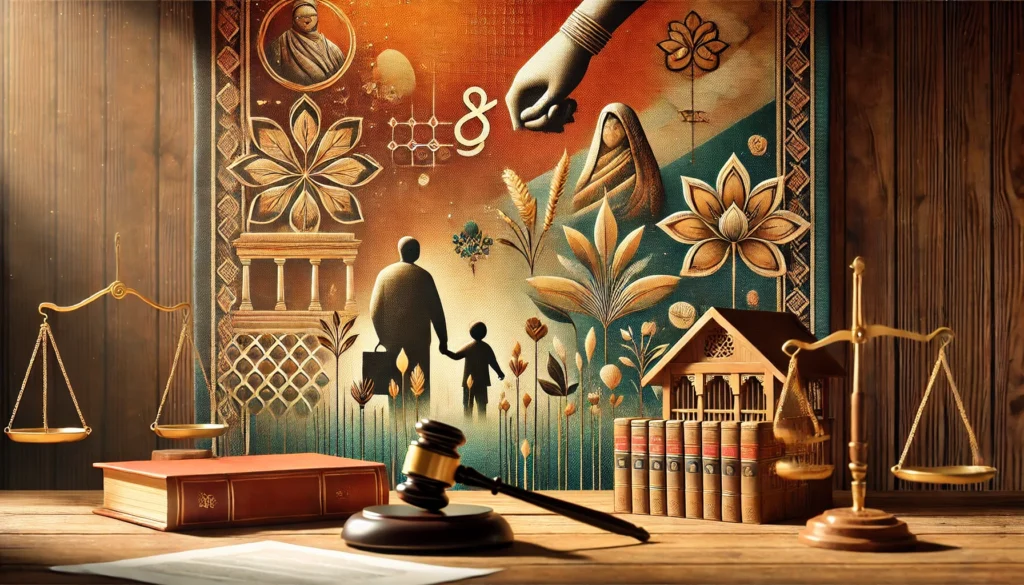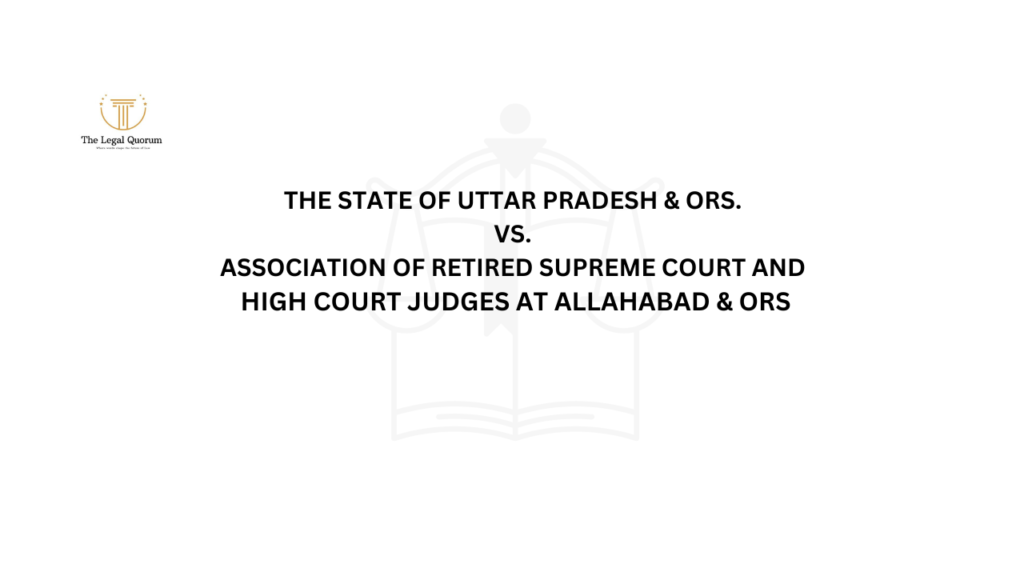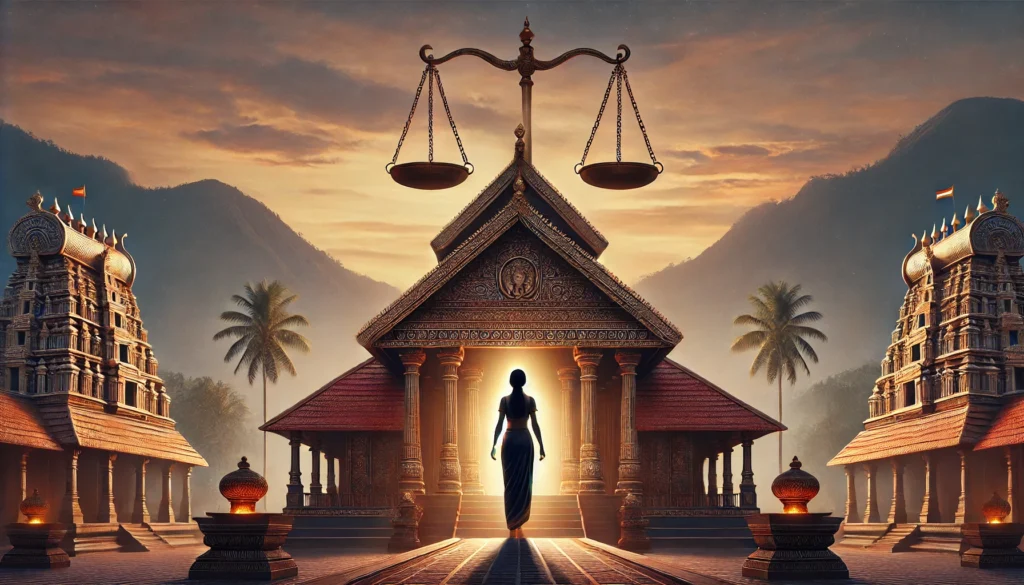Published On: November 19th 2025
Authored By: Sam S. Siryon
Apeejay Stya University, Gurgaon
Case No. Writ Petition (CVIL) No. 118 of 2016
Decided: August 22, 2017
Court: Hon’ble Supreme Court of India
Citation: 9 SCC 1 SC
Bench: five-judge constitutional bench.
Parties: Shayara Bano vs. Union of India (represented by Secretary of Ministry of Women and Child Development) Ministry of Law and Justice, Ministry of Minority Affairs, the National Commission for Women, and Shri Rizwan Ahmad
INTRODUCTION:
August 22, 2017 marks a significant change in the Indian legal system wherein the Hon’ble Supreme Court declared the long-practiced custom of the Muslim religion regarding divorce. In such practice, a Muslim man who wishes to divorce his wife could do so by pronouncing “talaq” three times only, either in writing or orally. This was called “Talaq-e-Biddat”, it was practiced in the Muslim religion only. This kind of divorce was considered instant and could not be revoked, meaning that, it takes effect immediately upon pronouncement and can not be reversed. Basically, some Muslim communities which followed the Hanafi school of Islamic law were the most people involved in this practice.
After the 2017 judgement by the Hon’ble Supreme Court, this practiced was therein considered unconstitutional and violative of fundamental rights provided under Article 14, 15, and 21 of the Indian Constitution. Also, many Muslim majority countries have banned the practice of “triple talaq” including countries like Pakistan, Egypt and Bangladesh.
FACTS:
In this case at hand, the petitioner- Shayara Bano has been married to Rizwan Ahmed for about 15 years. However, in October 2015, due to her illness she had moved in with her parents, the husband-Rizwan Ahmed sent her a ‘talaq-nama’ (aka divorce notice) that invoked the talaq-e-biddat (the triple talaq) which means that she was never allowed to give consent nor to plea for reconciliation once that talaq was mentioned three times.
By this action, she moved to the Supreme Court and filed a writ petition in 2016 wherein she challenged the constitutional validity of the so-called talaq-e-biddat as well as some other religious practices under the Muslim personal law such includes the act of polygamy and the ‘nikah halala’ which allows for a divorced Muslim woman to marry, consummate the marriage and get divorced by that other man before remarrying her previous husband.
Bano argued that these practices violated her fundamental rights under the Indian constitution including those guaranteed under Article 14 (right to equality), Article 15 (freedom from discrimination on grounds of gender) and Article 21 (right to life and personal liberty which she maintained was inclusive of her right to live with human dignity).
ISSUES OF CONTENTIONS:
- Whether the practice of the talaq-e-biddat (instantaneous triple talaq) of the Muslim personal law was protected under the provisions of Article 25 of the Indian constitution?
- Whether the triple talaq infringes on the fundamental rights guarantee under the Indian constitution and whether such practice is unconstitutional?
ARGUMENTS:
Respondents; It was argued by the All India Muslim Personal law Board that the practice of triple talaq was an integral part of the Islamic jurisprudence and such has been in practice for over centuries. They further maintained that their personal laws including the marriage and divorce practices are rather protected under the provisions of Article 25 (right to practice, profess and propagate one’s own religion) of the Indian constitution.
The Petitioner’s counter argument; The petitioner argued that the practice of triple talaq was not rooted in the Quran but was rather a mere practice followed by some Islamic communities. They further argued that their Islamic religious teachings call for a structured and a thoughtful approach to divorce including attempts of reconciliation before the final separation. Furthermore, they argued that the so-called practice of the talaq-e-biddat was arbitrary and was against the basic practices of Shariat and the basic tenets of the Quran and thus it cannot be protected under the fundamental rights.
The Petitioners referred to the 2002 case of Shamim Ara v. State of Uttar Pradesh wherein the court had provided guidelines for valid talaq practices and they further requested the court to put a ban on the practice of the talaq-e-biddat on grounds that it violated the constitutional provisions of Article 14 and 15 and that by outlawing such The Dissolution of Muslim Marriage Act, 1939 would then be applicable to the entire Muslim community equally irrespective of gender or any other factor.
The Respondents argued that Muslim marriage is a private contract and does not require any judicial review in matters relating to or arising from it. They further maintained that the provisions of Article 13 do not include nor affect personal laws and that the Court can evaluate validity only after changes have been made by Parliament regarding secular activities such as the freedom of religious practices as provided under Article 25(2) of the Indian Constitution.
The respondents further that the practice of the talaq-e-biddat does not discriminate against Muslim women and does not promote bad marriages howbeit, women can claim remedies under;
The Special Marriage Act 1954, or by delegating right to talaq to herself or by insisting high Mehar amount.
FINDINGS AND JUDGEMENT:
The Hon’ble Supreme court held that the practice of talaq-e-biddat was unconstitutional and arbitrary, this was with the decision of a 3:2 majority of the five-judge constitutional bench including Justices R.F Nariman and U.U Lalit declaring that the triple talaq was manifestly arbitrary because it allows a marital tie to be broken impulsively without any attempt of reconciliation, they found it violative of the right to equality under Article 14.
This judgement affirmed that personal laws including the Muslim Personal laws like the Shariat Application Act, 1937 are subject to constitutional fundamental rights which cannot be violated.
Following the judgement, the Hon’ble Supreme court further directed the government to consider the decision taken by the Hon’ble court and promulgate legislation that would regulate divorce in the Muslim religion.
The Minority view was that, the practice of talaq-e-biddat was though objectionable but the Judiciary did not have the authority to interfere, make any reform or strike it down. And that it remains the duty of the legislature to frame laws that would govern such religious practices; this was the dissenting opinion of Chief Justice J.S Khehar and Justice Abdul Nazeer.
LEGAL PROVISIONS INVOLVED:
The Supreme court analyzed several constitutional articles to assess the validity of the practice of triple talaq in the case under discussion. These provisions include;
Article 13 (laws inconsistent with fundamental rights) the Hon’ble Supreme court held that, Muslims Personal Law (Shariat) Application Act, 1937 which toke cognizance of the talaq-e-biddat, was by fact, a ‘law in force’ under the provisions of Article 13(1) and was subject to judicial review. The Apex court maintained that it could be declared void if it is inconsistent with the fundamental rights guaranteed under the provisions of the Constitution.
Article 14 right to equality; the petitioner had argued that the triple talaq practice was violative of her fundamental right to equality as it discriminated her on grounds or gender. The court held that the triple talaq was arbitrary as it denied Muslim women equal treatment.
Article 15 prohibition of discrimination; it was argued that triple talaq discriminated against Muslim women on grounds of the sex.
Article 21 right to life and personal liberty; the talaq-e-biddat practice was seen to be violative of the right to life which is inclusive of the right to live with human dignity and personal security as a result of its arbitrary nature.
Article 25 freedom of religion; the Apex court ruled that the talaq practice was not an essential religious practice of the Islamic religion in its entirety and therefore was not protected under Article 25.
Another legislation which was being under questioned in the case was the Muslim Personal Law (Shariat) Application Act, 1937; this law stipulated the rule of decisions in matters relating to marriages and divorce in the Muslim religion. The apex court struck down the part of this legislation which promoted, enforced or propagate the practices of the talaq-e-biddat in the Muslim religion. And the court finally held that the practice of the triple talaq was unconstitutional.
SIGNIFICANCE OF THE CASE AND ITS RULING:
The judgement highlighted a move by the Apex court in balancing gender equality with religious identity. The court promoted gender equality, public order and morality while acknowledging the right to practice, profess and propagate religion. This action of the court reaffirmed its position in maintaining a State of secularism.
The judgement did not only promote gender equality but also supported the right of Muslim women by promoting a secure and just life in line with constitutional values.
References:
- iPleaders|Shayara Bano v. Union of India| Mahawar| last visited August 26, 2025 https://blog.ipleaders.in/shayara-bano-v-union-of-india/#Issues_involved
- Dristhi Judiciary|Shayara Bano v. Union of India and Ors. |AIR 2017 SC 4609| last visited August 26, 2025 https://www.drishtijudiciary.com/landmark-judgement/muslim-law/shayara-bano-v-union-of-india-and-ors-air-2017-sc-4609
- Testbook| Shayara Bano v. Union of India (2017) Triple Talaq Judgement| last visited August 26, 2025 https://testbook.com/landmark-judgements/shayara-bano-vs-union-of-india#:~:text=On%2022nd%20August%202017%2C%20the,21%20of%20the%20Indian%20Constitution.
- Dristhi Judiciary|Shayara Bano v. Union of India and Ors. |AIR 2017 SC 4609| last visited August 26, 2025 https://www.drishtijudiciary.com/landmark-judgement/muslim-law/shayara-bano-v-union-of-india-and-ors-air-2017-sc-4609




